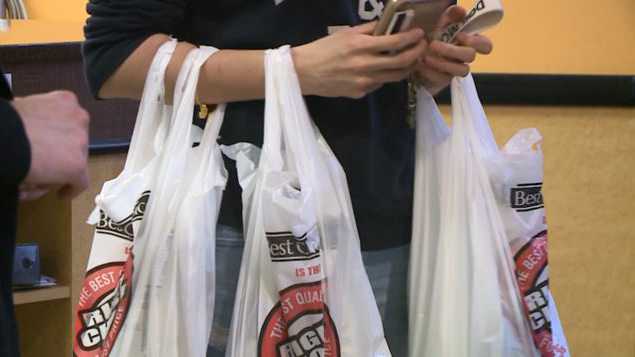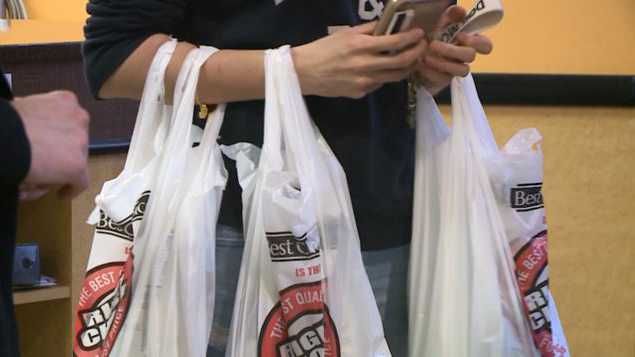
It’s a common question in the checkout line: “Paper or plastic?” An ordinance set to go before the Omaha City Council would ban the plastic option from grocery stores. “I do think it’s a good question to be talking about at this time frame and along with the trash contract,” said City Council member Pete Festersen. “As to what are we doing to reduce waste stream in our communities? And what are we doing to prevent litter that we see in our sewers and our parks and our trees and our vacant lots?” Festersen, along with City Council President Ben Gray, put forward the ordinance to ban single-use plastic bags in retailers primarily selling food. Stores could continue using paper sacks. The current proposal would not ban plastic produce bags. “This ordinance would start that conversation, and it would ban plastic bags in food sales establishments. So essentially large grocery stores to start with, because I think that’s where the prevalence of them occur,” Festersen said, “It does not apply to things like convenience stores, gas stations or dry cleaners or anything like that. We want to start with a manageable target at first and measure it and see how it goes. But we think it’s a good place to start.”Festersen said the ordinance should appear on the City Council agenda next week, along with a proposed waste collection contract, recommended by Mayor Jean Stothert. The new waste collection contract would run for 10 years at a cost of $22.7 million annually. “I think it’s all one in the same conversation,” Festersen said. Stothert has said in the past she would support a plastic bag ban but not a fee. Some large grocery chains with a presence in the metro have already committed to similar measures. Kroger, which owns Bakers, said the company plans to phase out all plastic bags by 2025. In a statement, Kroger said: “We firmly believe reusable bags are the best solution…. Switching to paper is not enough. Paper bags have their own environmental drawbacks, as do some other options such as compostable and biodegradable…Additionally, we have been working on reducing waste across our business for many years now and phasing out plastic bags accelerates our commitment at Baker’s. We already train our associates to reduce the number of single-use bags at checkout. We continue to offer in-store recycling through our front-of-store plastic bag and film collection program.” Aldi said it has never offered single-use plastic bags at check-out, and the company noted additional sustainability efforts in a statement: By 2025, 100 percent of ALDI packaging, including plastic packaging, will have reusable, recyclable or compostable packaging;By 2025, packaging material of all ALDI-exclusive products to be reduced by at least 15 percent;By 2020, 100 percent of ALDI-exclusive consumable packaging to include How2Recycle label;By 2020, implement an initiative to make private-label product packaging easier for customers to reuse;Guide continuous improvement of product packaging by internal expertise and external evaluations.Hy-Vee did not directly respond to the possibility of a plastic bag ban, but company representatives said in a statement, “We encourage customers to increase the number of plastic bags brought back to our stores for recycling. Some stores offer a discount of up to 5 cents per bag when customers use their reusable bags. We also place reusable bags close to our check outs as an alternative to plastic bags. Last year, we sold more than 207,000 reusable bags as more and more shoppers choose an environmentally friendly option. All of our stores provide plastic bag recycling, with bins typically placed at entrances for our customers’ convenience. Also, we accept plastic bags from any retailer, not just Hy-Vee. Last year, our stores recycled more than 2.7 million pounds of plastic shopping bags and stretch wrap.” Festersen said stores like Target and Walmart are considered general retail and are not included in the ordinance as written.
It’s a common question in the checkout line: “Paper or plastic?”
An ordinance set to go before the Omaha City Council would ban the plastic option from grocery stores.
Advertisement
“I do think it’s a good question to be talking about at this time frame and along with the trash contract,” said City Council member Pete Festersen. “As to what are we doing to reduce waste stream in our communities? And what are we doing to prevent litter that we see in our sewers and our parks and our trees and our vacant lots?”
Festersen, along with City Council President Ben Gray, put forward the ordinance to ban single-use plastic bags in retailers primarily selling food. Stores could continue using paper sacks.
The current proposal would not ban plastic produce bags.
“This ordinance would start that conversation, and it would ban plastic bags in food sales establishments. So essentially large grocery stores to start with, because I think that’s where the prevalence of them occur,” Festersen said, “It does not apply to things like convenience stores, gas stations or dry cleaners or anything like that. We want to start with a manageable target at first and measure it and see how it goes. But we think it’s a good place to start.”
Festersen said the ordinance should appear on the City Council agenda next week, along with a proposed waste collection contract, recommended by Mayor Jean Stothert.
The new waste collection contract would run for 10 years at a cost of $22.7 million annually.
“I think it’s all one in the same conversation,” Festersen said.
Stothert has said in the past she would support a plastic bag ban but not a fee.
Some large grocery chains with a presence in the metro have already committed to similar measures.
Kroger, which owns Bakers, said the company plans to phase out all plastic bags by 2025. In a statement, Kroger said:
“We firmly believe reusable bags are the best solution…. Switching to paper is not enough. Paper bags have their own environmental drawbacks, as do some other options such as compostable and biodegradable…Additionally, we have been working on reducing waste across our business for many years now and phasing out plastic bags accelerates our commitment at Baker’s. We already train our associates to reduce the number of single-use bags at checkout. We continue to offer in-store recycling through our front-of-store plastic bag and film collection program.”
Aldi said it has never offered single-use plastic bags at check-out, and the company noted additional sustainability efforts in a statement:
- By 2025, 100 percent of ALDI packaging, including plastic packaging, will have reusable, recyclable or compostable packaging;
- By 2025, packaging material of all ALDI-exclusive products to be reduced by at least 15 percent;
- By 2020, 100 percent of ALDI-exclusive consumable packaging to include How2Recycle label;
- By 2020, implement an initiative to make private-label product packaging easier for customers to reuse;
- Guide continuous improvement of product packaging by internal expertise and external evaluations.
Hy-Vee did not directly respond to the possibility of a plastic bag ban, but company representatives said in a statement,
“We encourage customers to increase the number of plastic bags brought back to our stores for recycling. Some stores offer a discount of up to 5 cents per bag when customers use their reusable bags. We also place reusable bags close to our check outs as an alternative to plastic bags. Last year, we sold more than 207,000 reusable bags as more and more shoppers choose an environmentally friendly option.
All of our stores provide plastic bag recycling, with bins typically placed at entrances for our customers’ convenience. Also, we accept plastic bags from any retailer, not just Hy-Vee. Last year, our stores recycled more than 2.7 million pounds of plastic shopping bags and stretch wrap.”
Festersen said stores like Target and Walmart are considered general retail and are not included in the ordinance as written.

